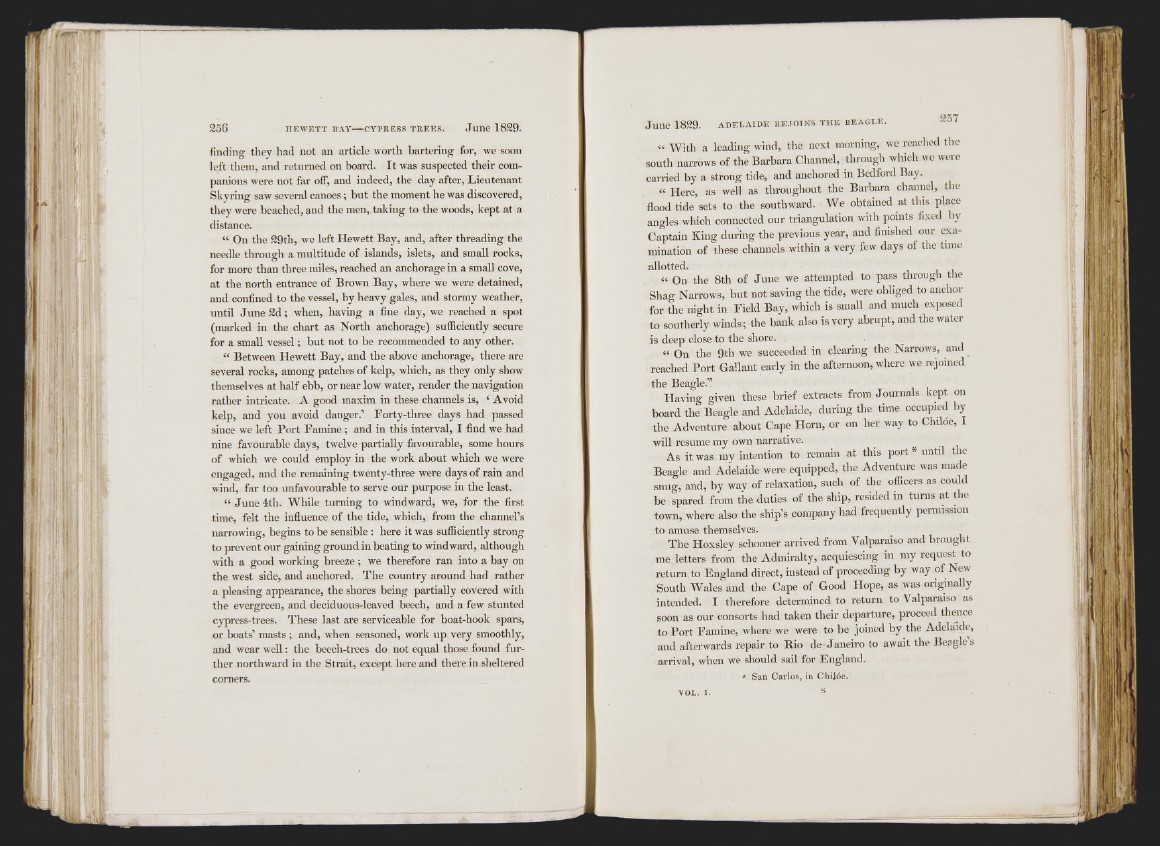
f i fI m nrr
I l { ■
I! ;tu
w
l ‘ l l l j l ‘
1 1 it t* I ■ ! 1I Ir
!,il
rr
! r - F « i>'
4 ' '11
; i f f 4 ;
[4 III:.:,"'
1' I
[1
finding they liad not an article worth bartering for, we soon
left them, and returned on board. It was suspected their companions
were not far off, and indeed, the day after. Lieutenant
Skyring saw several canoes; but the moment he was discovered,
tliey were beached, and the men, taking to the woods, kept at a
distance.
“ On the 29th, we left Hewett Bay, and, after threading the
needle through a multitude of islands, islets, and small rocks,
for more than three miles, reached an anchorage in a small cove,
at the north entrance of Brown Bay, where we were detained,
and confined to the vessel, by heavy gales, and stormy weather,
until June 2d; when, having a fine day, we reached a spot
(marked in the chart as North anchorage) sufficiently secure
for a small vessel; but not to be recommended to any other.
“ Between Hewett Bay, and the above anchorage, there are
several rocks, among patches of kelp, which, as they only show
themselves at half ebb, or near low water, render the navigation
rather intricate. A good maxim in these channels is, ‘ Avoid
kelp, and you avoid danger.’ Forty-three days had passed
since we left Port Famine ; and in this interval, I find we had
nine favourable days, twelve partially favourable, some hours
of which we could employ in the work about which we were
engaged, and the remaining twenty-three were days of rain and
wind, far too unfavourable to serve our purpose in the least.
“ June 4th. While turning to windward, we, for the first
time, felt the influence of the tide, which, from the channel’s
narrowing, begins to be sensible : here it was sufficiently strong
to prevent our gaining ground in beating to windward, although
with a good working breeze ; we therefore ran into a bay on
the west side, and anchored. The country around had rather
a pleasing appearance, the shores being partially covered with
the evergreen, and deciduous-leaved beech, and a few stunted
cypress-trees. These last are serviceable for boat-hook spars,
or boats’ masts ; and, when seasoned, work up very smoothly,
and wear well: the beech-trees do not equal those found further
northward in the Strait, except here and there in sheltered
corners.
“ With a leading wind, the next morning, we reached tlie
south narrows of the Barbara Channel, through which we were
carried by a strong tide, and anchored in Bedford Bay.
“ Here, as well as throughout the Barbara channel, the
flood tide sets to the southward. A V e obtained at this place
angles which connected our triangulation with points fixed by
Captain King during the previous year, and finished our examination
of these channels within a very few days of the time
allotted. I l l
“ On the 8th of June we attempted to pass through the
Shag Narrows, hut not saving the tide, were obliged to anchor
for the night in Field Bay, which is small and much exposed
to southerly winds; the bank also is very abrupt, and the water
is deep close to the shore.
“ On the 9th we succeeded in clearing the Narrows, and
reached Port Gallant early in the afternoon, where we rejoined
the Beagle.”
Having given these brief extracts from Journals kept on
board the Beagle and Adelaide, during the time occupied by
the Adventure about Cape Horn, or on her way to Childe, I
will resume my own narrative.
As it was my intention to remain at this port * untd the
Beagle and Adelaide were equipped, the Adventure was made
snug, and, by way of relaxation, such of the officers as could
be spared, from the duties of the ship, resided in turns at the
town, where also the ship’s company had frequently permission
to amuse themselves.
The Hoxsley schooner arrived from Valparaiso and brought
me letters from the Admiralty, acquiescing in my request to
return to Fngland direct, instead of proceeding by way of New
South Wales and the Cape of Good Hope, as was originally
intended. I therefore determined to return to Valparaiso as
soon as our consorts had taken their departure, proceed thence
to Port Famine, where we were to be joined by the Adelaide,
and afterwards repair to Rio de-Janeiro to await the Beagles
arrival, when we should sail for Fngland.
* San Carlos, in Chijoe.